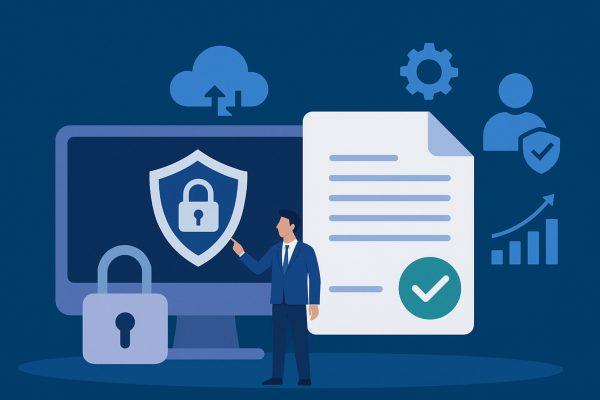How Can Compliance Management Services Support ISO 27001 Certification?
Achieving ISO 27001 certification is a significant milestone for any organization looking to demonstrate its commitment to information security. Compliance Management Services in Sheridan, WY plays a crucial role in supporting businesses to meet the requirements of ISO 27001 effectively. In this blog, we will discuss how compliance management services can support ISO 27001 certification and why they are essential for maintaining robust information security practices.
What is ISO 27001 Certification?
ISO 27001 is an internationally recognized standard that outlines the requirements for establishing, implementing, maintaining, and continually improving an information security management system (ISMS). The certification helps organizations manage the security of assets such as financial information, intellectual property, employee details, and third-party data. The primary aim of ISO 27001 is to safeguard the confidentiality, integrity, and availability of information.
The Importance of Compliance Management Services
Compliance management services provide comprehensive support to organizations in meeting regulatory requirements, industry standards, and security frameworks like ISO 27001. These services help businesses streamline their processes, identify potential risks, and ensure ongoing adherence to applicable regulations.
Key Benefits of Compliance Management Services
- Expert Guidance: Compliance management services bring expertise to guide organizations through complex regulatory requirements.
- Risk Identification and Mitigation: These services assist in identifying potential security risks and implementing measures to mitigate them.
- Streamlined Processes: Compliance services help streamline documentation, audits, and other processes necessary for certification.
- Continuous Monitoring: They provide continuous monitoring and auditing to ensure that security measures remain effective and up-to-date.
How Compliance Management Services Facilitate ISO 27001 Certification?
Compliance management services play a pivotal role in supporting the ISO 27001 certification process. Here’s how they assist at different stages:
1. Initial Assessment and Gap Analysis
One of the first steps in achieving ISO 27001 certification is understanding the current state of the organization’s ISMS. Compliance management services conduct a comprehensive assessment to identify gaps between existing security practices and the ISO 27001 requirements. This analysis provides a clear roadmap for necessary improvements.
Benefits of Gap Analysis:
- Identification of Weak Points: Helps identify areas that need strengthening.
- Action Plan Creation: Develops a targeted action plan to address identified gaps.
2. Policy Development and Implementation
ISO 27001 requires well-documented policies and procedures for effective information security management. Compliance management services assist in creating, reviewing, and implementing these policies to align with the certification standards.
Key Policy Areas Supported:
- Information Security Policy: Outlines the organization’s approach to information security.
- Access Control Policy: Specifies how access to information is managed.
- Incident Response Plan: Provides guidelines for responding to security incidents.
3. Risk Assessment and Management
A fundamental aspect of ISO 27001 is conducting a thorough risk assessment. Compliance management services facilitate this process by identifying risks, evaluating their impact, and recommending suitable risk treatment plans.
Steps in Risk Management:
- Risk Identification: Recognizes potential threats to information security.
- Risk Analysis: Assesses the likelihood and potential impact of identified risks.
- Risk Treatment Plan: Provides strategies for mitigating or accepting risks.
4. Staff Training and Awareness Programs
For ISO 27001 certification to be effective, employees must understand their roles in maintaining information security. Compliance management services offer tailored training programs to enhance staff awareness and ensure they are well-versed in security practices.
Importance of Training:
- Increases Awareness: Employees are better equipped to handle security threats.
- Enhances Compliance: Ensures that staff activities align with the organization’s security policies.
5. Documentation and Record-Keeping
ISO 27001 requires detailed documentation, including risk assessments, policy manuals, and records of corrective actions. Compliance management services assist in developing and maintaining these records to ensure they meet certification standards.
Documentation Support Includes:
- ISMS Scope Document: Defines the boundaries of the ISMS.
- Risk Treatment Plan: Details measures taken to address risks.
- Audit Logs: Maintains records of internal audits and findings.
6. Internal Audits and Continuous Improvement
Internal audits are a critical component of ISO 27001, allowing organizations to assess the effectiveness of their ISMS. Compliance management services perform internal audits to ensure that all processes align with ISO 27001 standards and identify opportunities for continuous improvement.
Benefits of Internal Audits:
- Identifies Non-Conformities: Detects deviations from ISO 27001 requirements.
- Supports Continuous Improvement: Helps organizations refine their processes.
7. Assistance During External Audits
The final step in obtaining ISO 27001 certification is passing an external audit conducted by a certification body. Compliance management services prepare organizations for these audits by conducting pre-audit assessments, providing necessary documentation, and guiding employees on audit expectations.
Pre-Audit Preparation:
- Mock Audits: Simulates the external audit process to identify potential issues.
- Audit Support: Provides real-time assistance during the external audit to address any queries.
8. Post-Certification Support and Maintenance
ISO 27001 certification is not a one-time event. It requires continuous maintenance to ensure ongoing compliance. Compliance management services offer post-certification support to monitor the effectiveness of the ISMS, conduct regular audits, and make necessary adjustments.
Post-Certification Services:
- Periodic Reviews: Ensures that the ISMS remains effective.
- Updated Training: Keeps staff informed of new security practices.
- Regulatory Updates: Adapts policies and procedures to align with changes in regulatory requirements.
Why Choose Compliance Management Services for ISO 27001?
Achieving and maintaining ISO 27001 certification can be challenging, especially for organizations without dedicated compliance teams. Compliance management services provide expertise, resources, and support that make the process manageable and efficient. By choosing these services, organizations can:
- Save Time and Resources: Reduce the time spent on documentation, audits, and policy development.
- Ensure Comprehensive Compliance: Cover all aspects of the ISO 27001 requirements.
- Improve Security Posture: Strengthen the overall security measures within the organization.
Conclusion
Compliance management services are invaluable for organizations seeking ISO 27001 certification. They provide the necessary support, from initial assessments and risk management to policy development and audit preparation. By leveraging compliance management services, businesses can ensure a smoother path to certification and maintain a strong, secure environment that meets international standards.
ISO 27001 certification is not just a checkbox; it is a commitment to protecting information and maintaining trust with clients and stakeholders. Compliance management services are an essential partner in this journey, offering expertise and ongoing support to help organizations achieve and sustain certification.
Author







